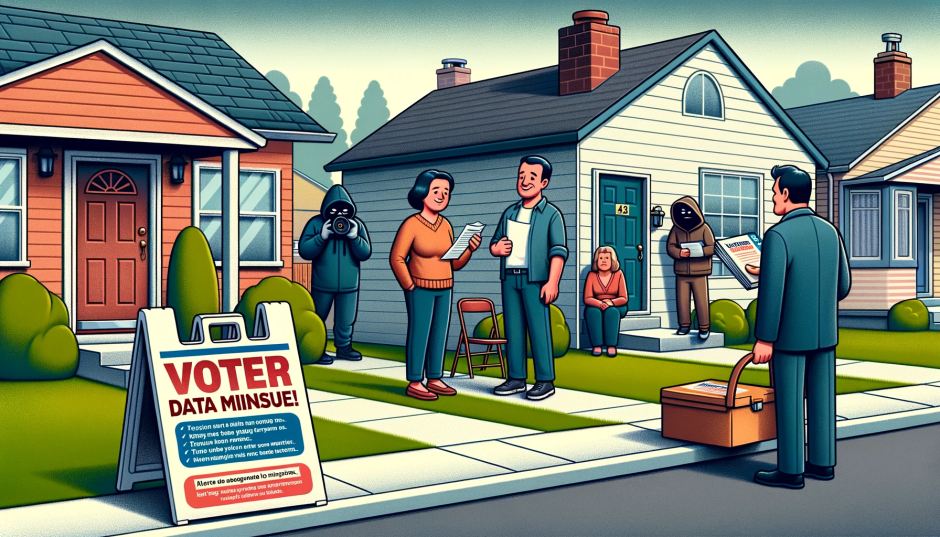Political parties, Canada’s influence industry, and YOU
Canada's political parties are targeting and surveilling us scot-free– it's time we do something about it.
Picture this: It’s election time and your doorbell rings: there’s a friendly canvasser outside! They give you their spiel, hand you some literature, ask how you intend to vote, and do their best to convince you to vote for their candidate. Perhaps you discuss some of the issues most important to you.
Interactions like this are the lifeblood of democracy. Most canvassers are unpaid volunteers: they put in the time because they truly believe in candidate X or party Y. Unfortunately, the more recent advent of Big Data has resulted in a worrying dark side to this proud democratic tradition. Nowadays, those canvassers are, more often than not, armed with smartphone apps, and parties train them not just to convince you of the merits of their candidates, but to upload what you tell them to databases in their party’s headquarters.
Today, we’re announcing that we’ve teamed up with one of Canada’s leading privacy experts on a new project that will shine a spotlight on how political parties use — and misuse — your private data.
Did you know that in Canada, our privacy laws impose no general legal obligation on political parties to keep your personal information private or secure? Unlike almost every other democratic country in the world, Canadian political parties are mostly free to use and abuse your data however they choose.
What’s more, they want to keep it that way. The federal government recently snuck a clause into its budget implementation bill that aims to permanently exclude political parties from Canadian privacy laws — the same laws that ensure all other public and private sector bodies are required to keep your data secure. Effectively, that means your local corner store or barber shop would be held to higher data privacy standards than federal political parties.
To us, these double standards stink, and thousands of you spoke up to agree, calling for political parties to be brought within Canada’s legal privacy framework. We submitted a detailed brief arguing the same, and even won some high-powered support along the way: after considering the matter carefully, the Senate’s Legal and Constitutional Affairs Committee warned that the lack of privacy safeguards “can impact Canadians’ trust in federal political parties and, by extension, the electoral process in general.”
Did we win? Unfortunately, not yet. Given the level of opposition, and the resulting media coverage, the government could have reconsidered the clause in question. Instead, they ignored the voices of Canadians, the Senate report, the testimony of the federal Privacy Commissioner, and the head of Elections Canada (!), and pushed the measure through unamended.
So, is that it? Not at all! Over the coming months, we’ll be launching a new research project, examiningthe companies and tools that political parties rely on to target and influence voters. It’s inspired by the work of our international peer Tactical Tech’s Influence Industry database, which examines voter privacy on a global scale. We’re bringing it home to Canada.
To make sure our work has the needed chops, we’ve been working closely with Professor Colin Bennett of the University of Victoria, who has been researching the subject supported by a Social Sciences and Humanities Research Council Insight Grant. Colin is Canada’s foremost expert on how political parties manage your private data, and an outspoken critic of the current lack of safeguards.
So, what can you expect over the next few months?
- First, remember those giant political party databases we mentioned earlier? If you’ve ever signed a petition sponsored by a political party, attended a political event, or even contacted your local MP, that information is likely sitting in a political party database. Starting soon, we’ll explain how parties collect data from multiple sourcesto paint a detailed picture of you as an individual voter.
- Second, what about the companies helping them target us? We’ll be doing a deep dive into the companies that help political parties collect, store, and analyze your private data; then use that data to target and influence you. We’ll be asking: Who are these companies? How can they best be classified? What exactly do they do? Who are their clients in Canada (parties and candidates)? We’ll be making all of this information easily accessible to you.
- Third, we’ll look at what happens when things go horribly wrong. We’ll analyze what privacy breaches have already taken place, and the risks inherent in political parties keeping such quantities of sensitive information with insufficient safeguards.
And that’s not all: we’ll also be examining what needs to be done to hold political parties to account for their use of YOUR private data. And we’ll be keeping you updated on the progress of a pivotal Supreme Court case in British Columbia, in which federal political parties are trying to exempt themselves from B.C.’s privacy legislation which would finally place few rules on them - at least in one province!
The right to privacy is fundamental to our democratic process. With your support, we’re going to keep piling on the pressure until political parties — and the companies that enable them — are made to comply with privacy laws, and Canada is finally brought up to par with our fellow democracies.
Keen to stay in the loop? You can subscribe to stay up to date on our privacy work, or make a donation to keep this project and many others like it moving forward.


 Take action now!
Take action now!
 Sign up to be in the loop
Sign up to be in the loop
 Donate to support our work
Donate to support our work